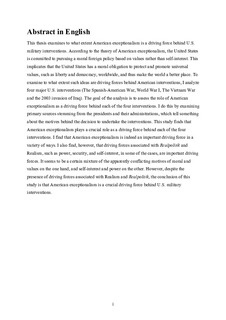Korstog for universelle verdier? En studie av den amerikanske eksepsjonalismens rolle som drivkraft bak USAs militære intervensjoner
Master thesis
Permanent lenke
http://hdl.handle.net/11250/2561728Utgivelsesdato
2017Metadata
Vis full innførselSamlinger
Sammendrag
This thesis examines to what extent American exceptionalism is a driving force behind U.S. military interventions. According to the theory of American exceptionalism, the United States is committed to pursuing a moral foreign policy based on values rather than self-interest. This implicates that the United States has a moral obligation to protect and promote universal values, such as liberty and democracy, worldwide, and thus make the world a better place. To examine to what extent such ideas are driving forces behind American interventions, I analyze four major U.S. interventions (The Spanish-American War, World War I, The Vietnam War and the 2003 invasion of Iraq). The goal of the analysis is to assess the role of American exceptionalism as a driving force behind each of the four interventions. I do this by examining primary sources stemming from the presidents and their administrations, which tell something about the motives behind the decision to undertake the interventions. This study finds that American exceptionalism plays a crucial role as a driving force behind each of the four interventions. I find that American exceptionalism is indeed an important driving force in a variety of ways. I also find, however, that driving forces associated with Realpolitik and Realism, such as power, security, and self-interest, in some of the cases, are important driving forces. It seems to be a certain mixture of the apparently conflicting motives of moral and values on the one hand, and self-interest and power on the other. However, despite the presence of driving forces associated with Realism and Realpolitik, the conclusion of this study is that American exceptionalism is a crucial driving force behind U.S. military interventions.
